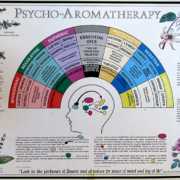Perfume notes, mystery of the sense of smell
A mixture of essences has a smell on its own, in perfumery is called an accord.
However, the nose retains its capacity to analyze the accord in order to detect each component.
This is very strange because the new smell is different from the original ingredients. The analysis is done through olfactory memories.
The accord will be perceived as a smell of its own by everybody, but the persons who already know the smell of each ingredient and their names will be able to analyze the accord.
Analysis of smell requires the help of the evolved part of the brain, particularly the orbitofrontal cortex and the language center.
I met a person who is able to detect the presence of the smallest quantity of Rose in my perfumes. He hated the smell of rose.
He would say, “This one no, there is rose”. And I would check my formulas to verify that there was a tiny touch of rose in them.
His nose did not detect the smell of rose inside the perfume, it was not possible, there was too little of it to be perceived. I know it well enough, having composed the perfume myself.
What he detected is the emotion that the smell of Rose awakened in him, because of his olfactory memories.
Probably he hated Rose because of a childhood trauma. He had been exposed to it in a situation of stress and distress and had memorized the smell, associating it with negative emotions.
Maybe he was beaten repeatedly by an aunty who was wearing rose perfume.
The same happens for many persons in Italy with the smell of Frankincense.
Italians go little to church while alive, but they never miss a mess when they die.
This is when the priest throws Frankincense all over the bereaved family, and they remain traumatized by this smell for the rest of their life associating it with sorrow, grief, and sadness.
Our nose acts as a detector, it detects the presence of smells associated with distress and warns us of the danger they represent, (according to our personal experience), by reproducing the emotion.
I have seen persons completely overwhelmed by the smells I showed them. To the point of crying and becoming non-functional.
These reflections teach us three things about our nose and olfaction:
- The nose has a synthetic perception of scents, thousands of aromatic molecules are identified as if they were a single odor.
- The nose has an analytic perception of scents and can be used as an instrument by the brain in order to split an odor into each of its components by name.
- The nose can act as a gas chromatography instrument, informing us about the presence of some components in a scent that is of particular relevance to us.
The conclusion is that human olfaction is no less than the one of animals, it is just different. We can smell with our brains in a way no animal can. Human beings, consciously or not, smell more with their brain than with their nose.
























Leave a Reply
Want to join the discussion?Feel free to contribute!